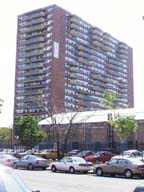Two groups have gathered petitions in an attempt to rescind recent City Council votes, and both may make history if they go to a public vote.
This past week, tenants at the former Gregory Park Towers Downtown submitted 3,448 signatures of a required 2,472 to put a rent control amendment to a public vote. Meanwhile, neighborhood groups fighting a 43-story dual high rise on near the Hoboken border submitted an additional 681 signatures to the City Clerk, after a portion of the group’s original 3,343 filed were deemed insufficient.
If the council chooses not to repeal the ordinances, it would be the first time under the current city government that referenda challenging a city ordinance would go to a vote.
Charging that the city stepped into the Gregory Park Towers issue where they had no jurisdiction, Jacquelyn Smith, head of the Gregory Park Tenants Association, said they will continue to fight. “The City Council placed themselves in the midst of our lawsuits,” she said last week.
The ordinance that is now being challenged by some 60 tenants would make a provision to allow former HUD-mortgage or HUD-owned building coming out of bankruptcy to be subject to a one-time rent increase at market value, and thereafter be placed under rent control.
The council voted 6-3 last month to adopt the ordinance.
The now-dubbed “Metropolis Towers,” were on the brink of foreclosure when George Filopoulos, of Queens-based Metrovest, in 1999 assumed a portion of the buildings’ $25 million mortgage owed to the federal department of Housing and Urban Development. He also took over 340 of the two buildings’ 770 units as a major “shareholder.” But when he tried to raise rents – some by as much as 200 percent – on the advice of the city’s rent leveling administrator, he got sued. Filopoulos lost when a Hudson County Superior Court Judge determined that the buildings should still be considered under rent control.
He then got the City Council to approve an amendment to the current rent control law to specifically apply to similar buildings.
Negotiations for a settlement on the matter have stalled, according to Metrovest attorney Brian Doherty, who was upset with tactics employed by tenants seeking petition signatures.
“They’ve told people that rent control is in jeopardy,” he said, “when it only really affects one specific co-op. They’re deceiving the public that the city has rescinded rent control.”
Responded Smith: “They did repeal rent control at Metropolis Towers.”
Tower power
Groups fighting the granting of a tax abatement for a high-rise project shadowing the Hoboken border submitted more signatures this week, after they learned they were short on the initial submission.
In order for the petition to be certified, signatures must come from registered Jersey City voters.
The fight against Millennium Towers, a dual 43-story luxury high rise proposed on a slip of land on 18th Street between Grove Street and Jersey Avenue, has been waged for most of this year. The major objections are coming from residents of the Heights, who claim that the towers will block views and choke traffic.
The groups, headed by Riverview Neighborhood Association’s Vito Brunetti and Sergeant Anthony Association Vice President Robert DuVal, say that the fight is about the granting of tax abatements in general, not merely one project. The vote, though, will only be for one project.
Tax abated projects pay fixed amounts that are less than the usual property taxes to the city’s coffers. Mayor Bret Schundler has argued that the city would lose out on development if the incentives were not offered, while critics say that granting tax breaks makes little sense in the current real estate boom.
The Heights groups have also filed a lawsuit against the city and Millennium Towers developer United Diversified of Bayonne, in an attempt to rescind the zoning change that cleared the way for the towers’ approval. Hoboken has filed a similar suit.
No initiative has gone to a vote since the city changed its form of government in 1960, according to City Clerk Robert Byrne. The last time a referendum made it to this point was 1983, when former Mayor Gerald McCann attempted to change the city’s rent control ordinance to allow for vacancy decontrol. Before going to a public vote, the council chose to repeal the amended ordinance.
The council can choose to repeal both ordinances before they go to a public vote, but at this point it seems unlikely that would happen. Votes on both initiatives could come in early 2001.
A vote on one referendum would cost the city approximately $200,000, according to Byrne.
